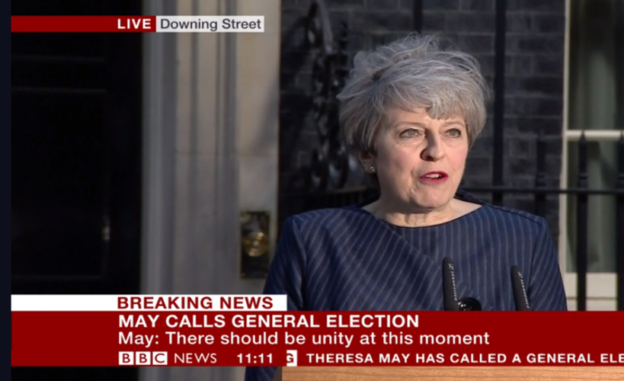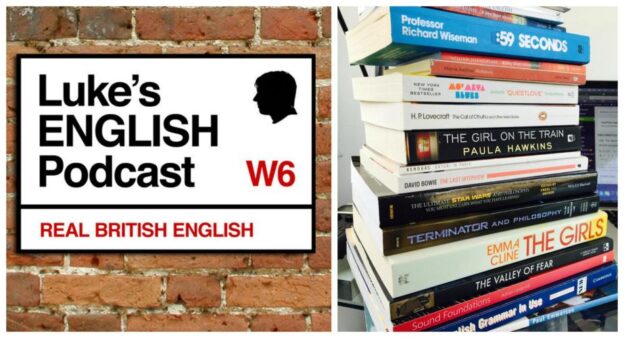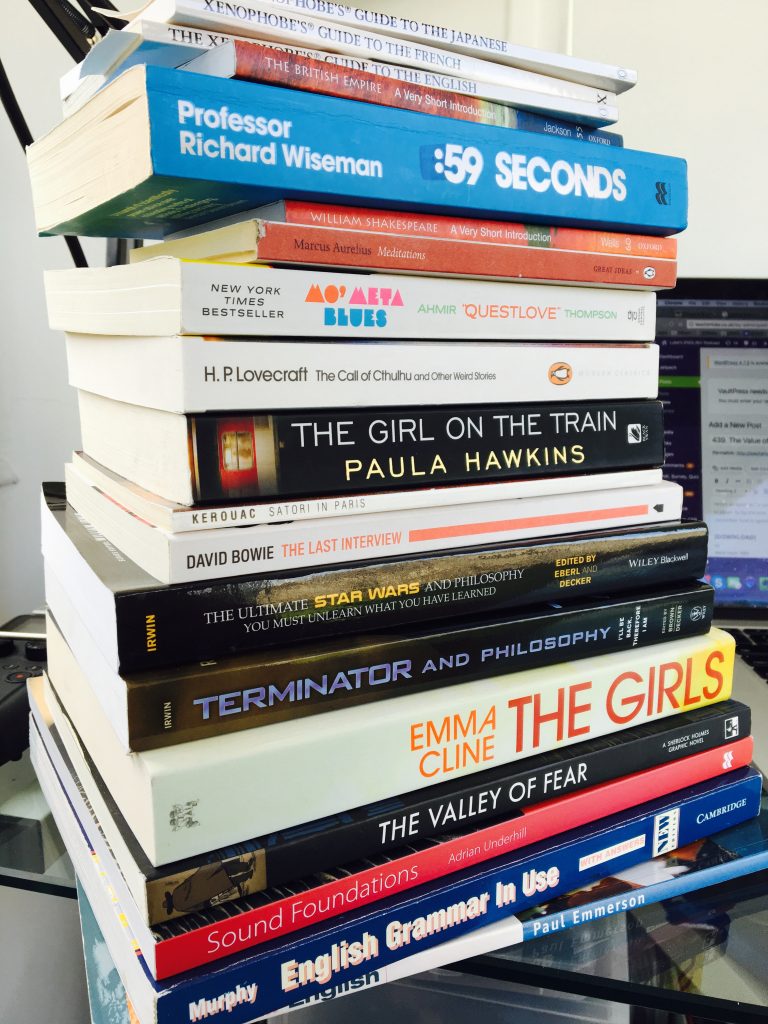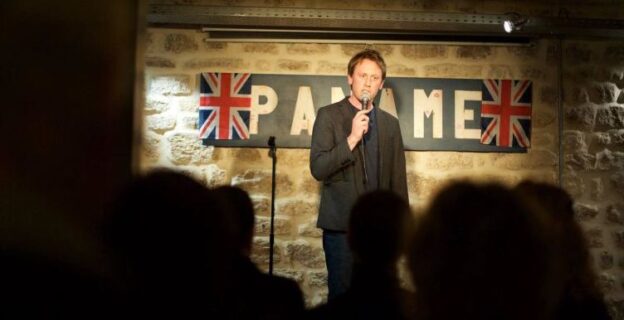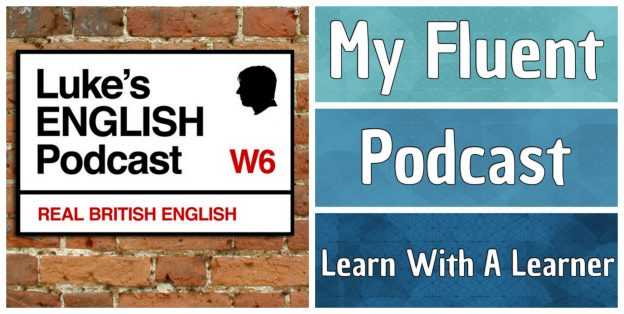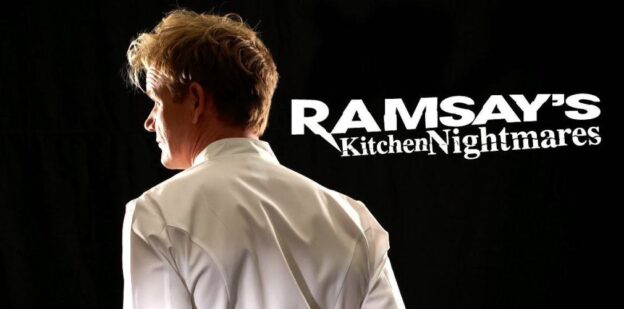Politics is back on LEP as I talk to my Dad about recent developments in the UK, specifically the General Election which is due to take place on 8 June.
![]() [DOWNLOAD]
[DOWNLOAD]
Introduction & Summary Transcript
Last week something surprising happened. The British PM Theresa May announced a “snap general election” – meaning, she called an election earlier than expected and with a short time between the announcement and the date of the election. That’s what a ‘snap’ general election is. In this case the general election is going to happen on 8 June this year.
So this is a general election, which means that all the MPs in the UK’s House of Commons in Westminster, London could change. I don’t think they will all change but we will see a different arrangement for sure, with parties either losing or gaining seats, and the government could change as well. The House of Commons is where all the MPs sit. Each seat in commons represents a different part of the country – the different constituencies. People will go out to the polling stations, vote for an MP for their constituency and the one who wins the most votes in that constituency gets that seat. The party which gets the majority of seats in the House of Commons has the right to form a government. At the moment that’s the Conservatives since they won the majority of seats by a fairly small margin in the last general election we had, which was in 2015, i talked about it on this podcast. How is our parliament and our government going to change with this election? How’s that going to affect the direction the country goes in?
So, politics is in the news (as it always is) so I think it’s time to talk some more about this subject on this podcast, so let’s talk to my dad Rick Thompson again. My dad is a journalist who worked at the BBC for years and he’s also a visiting professor at the University of Central England. Generally he’s a well-informed and articulate person and certainly he’s the one I always ask when I want to know all about something that’s happening in the news. So, let’s talk to Rick Thompson about this snap election, what it all means, and how it relates to this ongoing story of Brexit and politics in the UK.
Before we do that I think it might be necessary to give you a bit of a summary of the story so far, in terms of British politics. This will take about 10 minutes but it’s important context.
I’ve been covering politics in the UK since the 2015 election, doing episodes every now and again about the political situation and events, attempting to talk about them in a balanced way while also giving my personal take on things. You can go back and listen to them – since summer 2015.
In any case, here’s a brief summary of British politics over the last couple of decades to just make it as clear as possible because context is everything. Without context it’s just a bunch of big sounding words and events that might not seem to have any significance. Also, it’s a good chance for you to hear some of the language of politics that you might have heard on this podcast before.
You can read this introduction and summary on the page for this episode. Watch out for certain terms and language relating to politics. There’s some nice vocabulary here and you can pick it up and use it when you discuss this subject too, because I’m sure many of you are discussing these things – politics in Europe but also politics in your countries. A lot of the language is basically the same.
A Summary of British Politics – The Main Parties
So we have two main parties in the UK and some other smaller ones which are still important, especially today.
The Conservatives – centre-right to right wing
They’re often described as the party of the rich. They tend to promote free market capitalism with the belief that allowing business to flourish benefits society as a whole because the money trickles down to everyone else through the creation of jobs etc. They believe in the private sector as the solution to society’s problems and that introducing competition in the marketplace between companies seeking profit will create the best conditions in all services, rather than the government stepping in and controlling things with regulation. So the Tories believe in small government. They’re the party that says they support hard work and dynamic entrepreneurialism – the idea that you can build a business yourself and if you work hard and have good ideas you can get rich and do great things and this benefits society in general. They’re criticised for not caring about ordinary working people, just supporting their friends at the top, being out of touch with ordinary life. They currently are the governing party.
Labour – centre-left to left wing.
Believe in supporting working people and creating conditions in which everyone can have a decent life. They believe that the government needs to support people in all areas by providing welfare, guidance and regulation to keep things balanced for all. The public sector has a responsibility to take part in many areas of life in order to constantly protect the interests of all people. More public spending, and re-distribution of wealth through higher taxation on the rich and higher public spending for services for the poor, equal opportunity programs etc. Criticised as being soft, idealistic, the ‘liberal left’, politically correct, tolerant of radical islam, incapable of managing the economy due to high levels of public spending and taxation which damages business. Being too controlling, too much influence in all areas of life like in people’s business concerns, the nanny state trying to control everything and stifling entrepreneurial instincts. They are the opposition party at the moment, struggling with their leader Jeremy Corbyn who is popular with Labour voters, but unpopular within the MPs themselves.
Liberal Democrats in the middle – they almost never get power and just sit in this kind of lukewarm water where they pick up voters who don’t really agree with the other two big parties. Considered a bit vague and untrustworthy considering they made U turns on many principles in their time in coalition govt with the tories and lost loads of seats in the last election. These days they are one of the the only major parties in England which is anti-Brexit.
Green party to the left of Labour – don’t get a lot of votes because they’re just too left wing even though their policies are about fairness and environmental protection. The left is criticised for being idealistic because they believe in high public spending, and “where’s the money going to come from?” Essentially they are a bit anti-capitalist because they’d make businesses pay for their programmes.
UKIP on the right of the tories – always focused on getting out of the EU and cutting immigration. Many members deny climate change, blame immigrants and the EU for all our problems and like to think they are the party for people who are sick of the political class.
SNP – the party for Scotland. Focused on protecting Scottish interests. Generally left wing policy for Scotland. They want independence.
Smaller parties include Plaid Cymru for Wales and several parties in Northern Ireland.
British Politics Since WW2
Over the years our country has generally swung between The Conservatives and Labour.
Following WW2 a Labour government set up the Welfare State – the state took control of the big institutions and utilities like the National Health Service, the railways, water, electricity, coal, steel etc that were like massive pillars of British economic and social life. This is what the country looked like in the decades after ww2.
In the late 70s and early 80s Thatcher (Conservative) totally changed the country by pushing liberal free market economics and beginning the dismantling of the welfare state. She oversaw the privatisation of state owned institutions, letting the markets and the private sector dominate our economy, making it very hard to go back.
The left wing was badly hurt. Partly due to failures in the pre-Thatcher era with the country being dominated by the labour unions and with a lack of growth in the economy. THatcher did revitalise things but she also damaged a lot of the working communities that relied on industries like coal mining. She pushed the country towards liberal economics like Reagan in the USA and we’ve been following that ever since.
Left wing was a bit stuck for a long time, nearly 20 years of Tories.
Tony Blair in the mid-nineties revitalised the Labour party by re-branding it “New Labour”. He took a centrist position, known as the ‘third way’ or Blairism.
Essentially this was the social position of the left with the economic position of the right.
Free-market capitalism was allowed to flourish, but with redistribution of wealth, high public spending on welfare services, progressive policies.
A lot of it was funded by the financial markets, banking ‘trickery’, credit, lending and so on.
It was like a Thatcherite economic model but with the heart of the left – he claimed to represent ordinary working people and wanted to create a level playing field in society to give everyone an equal chance. He was popular in the beginning and won a landslide victory in 1997. Generally he was quite good, but it all slipped when he took the country to war in Iraq and there were questions about the way he justified that.
Also the reckless manner in which the financial markets were allowed to play with our money led to a banking crisis as all the lending backfired when basically people couldn’t pay back all the debt and banks lost a lot of money.
It came from a culture of risky investment and frankly dodgy debt trading, which is kind of what happens when you let the markets just get away with anything.
Because our society is utterly dependent on credit, our economy took a big hit, just like it did all over the world.
Tony Blair handed over to his partner Gordon Brown who inherited this mess and tried to solve things with a mix of quantitative easing and other policies. Lacking the charisma of Blair and arriving at a time when everyone was a bit sick of Labour. Brown is remembered as a bit of an unpopular guy who also had to deal with the fallout of the Blair years.
Labour took a big hit in the 2010 election and lost.
Voter apathy and general distrust in politicians led to low voter turnout in 2010. The Conservatives got more votes than the other parties but not enough to form a government so they formed a coalition with Liberal Democrats who took the opportunity to play a role in government.
The government pushed an economic policy of austerity. The Liberal Democrats compromised a lot of their principles because the govt was basically led by the tories. They lost a lot of public support.
Scotland had a referendum to leave the UK but the vote ended up being to stay, but the SNP gained a lot of support and Scotland still might vote to leave the UK in order to remain in the EU.
The Tories continued to push austerity as their solution to the economic crisis.
The next election saw a surprising win for the Tories. They managed to win an outright majority. This is mainly because the SNP stole votes from Labour in the north. The Lib Dems lost loads of seats because people had lost faith in them. Labour’s leader Ed Miliband just wasn’t convincing enough. People probably felt that the Conservatives had a plan for the economy which they had to finish. Also the usual voter apathy meant that a lot of people didn’t vote and as a result only a portion of the population got what they wanted.
So the Tories carried on with their policy without the influence of the Lib Dems. No more coalition, just the tories.
Their policy: Cut public spending and yet relieve pressure on businesses to stimulate the economy. It also looked like they were making working people pay for the economic crisis caused by rich bankers who were also their friends.
Labour, in opposition, looked for a new leader. Surprisingly an old member of the party, Jeremy Corbyn, was chosen. He’s quite radically left wing. He’s popular with the grassroots voters, but not popular with the more centrist members of the party, including many Labour MPs and the party is quite split.
Meanwhile the economic crisis, unemployment and increasing immigration caused more competition in the job market and the cut in public services caused a lot of frustration among middle class and lower class people. UKIP gained more support by campaigning to reduce immigration and make Britain great again by getting out of Europe. They posed quite a big threat to the Conservatives both among voters and within the party. David Cameron the PM and Tory leader faced quite a lot of pressure from this growing Eurosceptic faction.
He came up with a plan to satisfy those Eurosceptic members of his party and prevent UKIP from stealing too much support from them. He had to be seen to be addressing the EU situation, taking a tough position.
He called a referendum on Europe while also planning to try and renegotiate Britain’s terms of membership. I think he believed he could use the referendum as a bargaining tool in Europe to get a better deal with more control of immigration and more control of business rules.
He thought the EU would say “ok you can have what you want, just don’t leave us!”
Dave imagined the referendum would be a choice between a better deal with EU or out.
He didn’t get the better deal he wanted, and you know how the anti-EU supporters campaigned hard for a leave vote by making lots of untrue claims, promises they couldn’t keep, presenting Brexit as the solution to all of the UK’s problems.
Surprise surprise, the country voted to leave the UK. 51.9% voted leave, 48.1% to remain.
Cameron, who had campaigned to remain promptly resigned, suggesting that he wasn’t the right man to lead the country into Brexit. There was a slightly messy leadership campaign, with Boris Johnson ultimately stepping down because he made a fool of himself with his leave campaign – too many promises he couldn’t keep and false claims. Theresa May was chosen by the Tories as the next leader. She was officially anti-Brexit during the referendum campaign, but she was chosen as the PM to lead the country through the Brexit negotiations. Crazy times.
A lot of people were angry with Jeremy Corbyn the Labour leader because he did not argue against Brexit strongly enough. As the leader of the left, he didn’t seem to care about Brexit that much and this probably damaged the remain campaign. It seems he doesn’t like Europe much. He lost a lot of support from shocked remain voters.
There was a high court claim by various people which argued that the government didn’t have the right to trigger article 50 (start Brexit process) without Parliament voting on it first. The claim was a success. Parliament voted to trigger article 50. In March Theresa May triggered Article 50. She also promised many times that she wouldn’t call a general election, and that “now wasn’t the time”.
Then, wow, she called a snap election and here we are. It was a surprise because we she didn’t need to do it until 2020.
Another general election on 8 June 2017.
Why has this happened? What’s the significance of this? What does it mean?
Let’s talk to my dad and see what he has to say.
What happened?
Theresa May has called a ‘snap’ General Election, to take place on 8 June 2017.
What does this mean?
That voters in the UK will be choosing new MPs in the house of commons.
We’ll get a new government, new arrangement in Parliament
Why did Theresa May call this election? She didn’t have to do it until 2020.
She says it’s because the country needs a united government. May needs a ‘mandate’ from the people to be able to oversee Brexit.
But really, this is just an opportunity for the Tories to grab more power because the opposition is a disaster.
How is this possible? How often do we have elections in the UK?
We have elections every 5 years more or less, but the government has the right to call elections whenever it wants. In the case of a ‘snap’ election like this, Parliament votes on it and it needs a ⅔ majority to go through. That’s going to happen because Corbyn has said Labour will back the snap election.
Why is Corbyn backing this election when it’s pretty certain that Labour will lose seats?
He’s in a Catch 22 situation. If he says no to the election it’s like admitting defeat.
What is going to happen?
Tories will gain a bigger majority, Labour will lose seats, Liberal Democrats will gain (because they’re the only ones fighting against Brexit so remainers will switch to them). But, anything can happen in politics, so let’s wait and see.
How is this related to Brexit?
What about the 48.1% that voted to remain?
Who do they have to vote for? Corbyn basically agrees with Brexit so the only party left is Lib Dem and they’re just not strong enough to win this. The Tories are bound to make big gains.
- Some vocabulary
- U turn
- Voter turnout
- Voter fatigue
- Campaign
- Televised debate
- Polls
- Brexit negotiations
- Mandate
